TMW #126 | Google and the final abstraction
Welcome to The Martech Weekly, where every week I review some of the most interesting ideas, research, and latest news. I look to where the industry is going and what you should be paying attention to.
👋 Get TMW every Sunday
TMW is the fastest and easiest way to stay ahead of the Martech industry. Sign up to get the full version delivered every Sunday for this and every TMW, along with an invite to the TMW community. Learn more here.
Google and the final abstraction
“Now we don’t take this for granted, so while our ambition is bold, our approach will always be responsible. Because our goal is to make AI helpful for everyone.”
These were words spoken in the opening message at last week’s Google IO. Words deliberately chosen by Google to announce its new suite of AI products, the biggest release yet of consumer-facing generative AI. Notice the words responsible and everyone. Two words that encapsulate Google’s entire strategy for dominating the generative AI landscape in the coming years.
Google’s strategy is this: Slow and steady will win the market while competitors blow themselves up.
During the Google IO keynote, AI was mentioned over 140 times – more than once every minute. But the most interesting thing that happened during the presentation was how they framed their upcoming updates for using generative AI in their suite of products. Of any of the companies to make successful strides into applying generative AI for the mainstream consumer, it’s Google.
After all, Google has been making AI products that integrate with their services for years. In fact, Google was the first company to develop the transformer: the foundational learning model upon which breakout generative AI products like ChatGPT were built on.
This is why Google should be the company to watch as generative AI continues to roll out. At the event, Google finally announced its Bing and ChatGPT competitor: a way to integrate generative search into the existing format and user experience of regular search – by introducing a responsive chat module at the top of search queries – showing what information and product searches look like.
This is what a topic-focused generative search looks like:
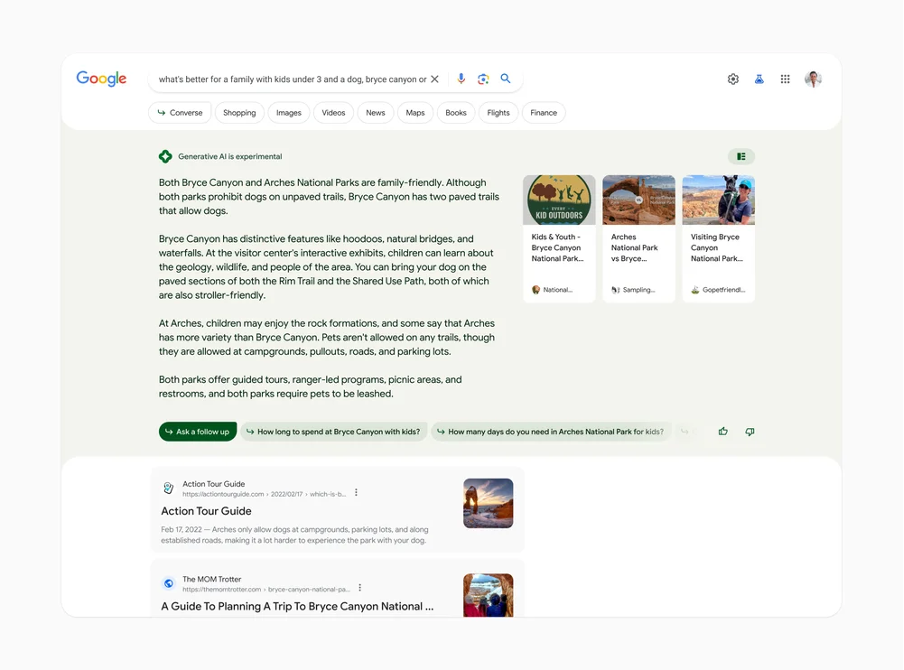
And while this announcement was not a surprise, more than ever, people are thinking about how these kinds of products can disrupt vast amounts of knowledge work, intellectual property, internet services, and online advertising. Generative AI has become a hype spiral entering its peak of many millions of people saying that the shift into generative AI will change things forever.
In a lot of ways, this is Google’s final boss. By degrading our own abilities to find things online (search), adding suggestive text to our word documents (writing), suggesting calculations (sheets), and giving us ready-made responses to email (communication), the problem with Google unleashing this kind of technology isn’t that it will reinforce its monopoly position across search, advertising, and software (that’s still bad): it’s that the final abstraction will render many of us who work with numbers, words, and images utterly impotent to do anything independently by the time we get to the next generation.
In this essay’s sister piece: TMW #078 | The great abstraction I make the argument (before ChatGPT came out!) that the end goal of AI is to abstract away not only code, data and information, but also complex skills and ideas:
“This begs the question - are there really any other kinds of complexity and scale that can be abstracted away for a large market of users who will find it useful enough to pay for? I would argue that yes, there is. But it requires a shift of thinking away from SaaS and apps to the kinds of skills and abilities that marketing, sales, customer service, art direction, and analytics bring to work every day. Up until this point we’ve been abstracting software. The next generation of apps will be abstracting and scaling people and their valuable skills.”
I want to offer another view of Google, one that is rarely discussed: How Google made the people whom marketers are trying to reach and convert highly reliant on Big Tech platforms. AI is the final destination for intellectual impotence, and will change how brands talk to consumers, how politicians talk to voters, how medical institutions talk to patients, and the list goes on. In other words: The last domain of human experience for tech is our intellectual life, and generative AI could own that domain.
A long time coming
Google has been making progress in dulling our intellectual powers since 1996 when Google Search first saw the light of day in a research paper for Stanford University. At the time, Google Search was among many other ranking algorithm programs competing to become the superior technology to succeed Yahoo’s arbitrary indexing of websites.
The internet at the time was small enough to list all the major sites on a couple of web pages. Since then, the internet now has an estimated 1.3 billion individual websites. So much human content and information exists on the ever-expanding horizon of thought that it’s mind-boggling.
As Google started building out the search product, it quickly became the dominant way to find information. No more wandering down the halls of a library, or following the cookie trail of citations and links to the right resources; with the right string of words in a search bar, you can find information instantly. Google did the same thing by acquiring YouTube – a platform for sharing video content, allowing anyone to search and find relevant content while creating an entire economy through ad monetization.
Soon enough, Google Maps appeared in app stores, removing our ability to navigate independently without a geolocation tracker and the ability to pinch and zoom around a terrain. Google brought us programmatic advertising, taking the burden away from agencies and marketers to find, qualify and negotiate ad placements with millions of publishers. Google then trained a generation of digital marketers on the widely used Google Analytics, a free analytics package to gain insight into online behaviors. Then came competitor products, and hundreds of failed product attempts spanning categories such as social networks, messaging, notes, B2B software, gaming, news, and photos.
It appears that Google has managed to spread its tentacles into almost every conceptual domain of human knowledge and functional value. But the technology that has its most valuable staying power is the thing that people don’t merely use but rely on for daily life. It’s this reliance that I argue is degrading our ability to navigate for ourselves, investigate for information, and with Google’s new chapter of generative AI: our ability to think for ourselves.
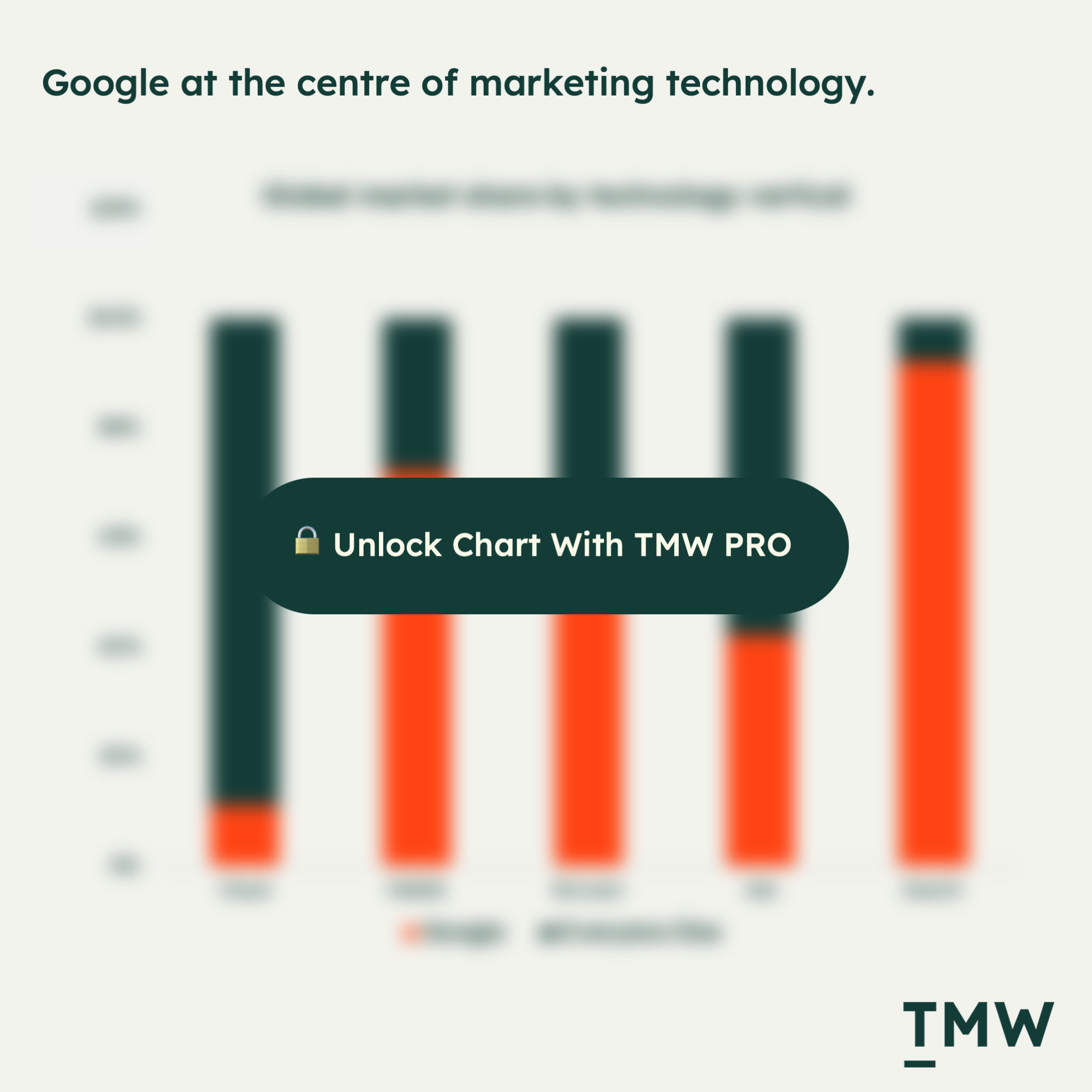
Google’s story, as presented by Sundar Pichai, is that the long trek to generalized AI has been partially solved by generative AI, and that Google’s been on this path for a long time. We need to reckon with the fact that Google has been incrementally introducing AI to the web for years now. The next natural phase for Google is to just entirely take over the intellectual burden of having to write documents, reply to emails, fill in cells, or create slide decks yourself.
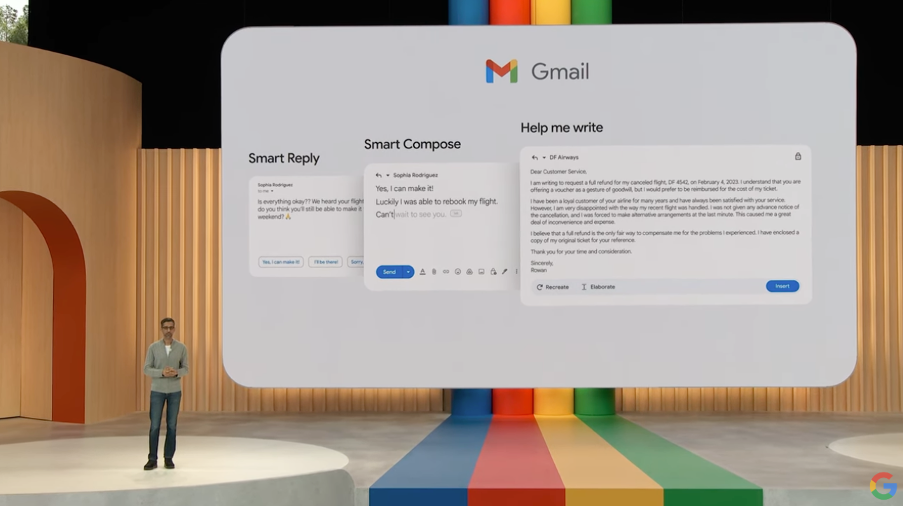
We’ve been using what Google calls AI for a long time without giving it much thought. And now with the help of OpenAI in preparing consumers to interface directly with AI, Google is making interactive AI tools the centerpiece of its strategy. To quote Pichai:
“This gives us so many opportunities to deliver our mission – to organize the world’s information, and make it universally accessible and useful. It’s a timeless mission that feels more relevant with each passing year. And looking ahead, making AI helpful for everyone is the most profound way we will advance our mission.”
AI has always been on the horizon; what Google got wrong was its expression of it – something that is arguably the most important element in how these technologies become the mainstream way to use the internet. The 1990s turned Google into a verb for search, but can it use this same word as a verb for using assistive AIs for daily tasks? If any company can do it, Google can.
A convenient prison
Now that Google has confirmed its direction for using generative AI, it’s important to see this in light of its sheer size and reach into consumers’ beyond any new company competing with this new technology. This includes OpenAI, the breakout company in AI that amassed 100 million users in only a few short months.
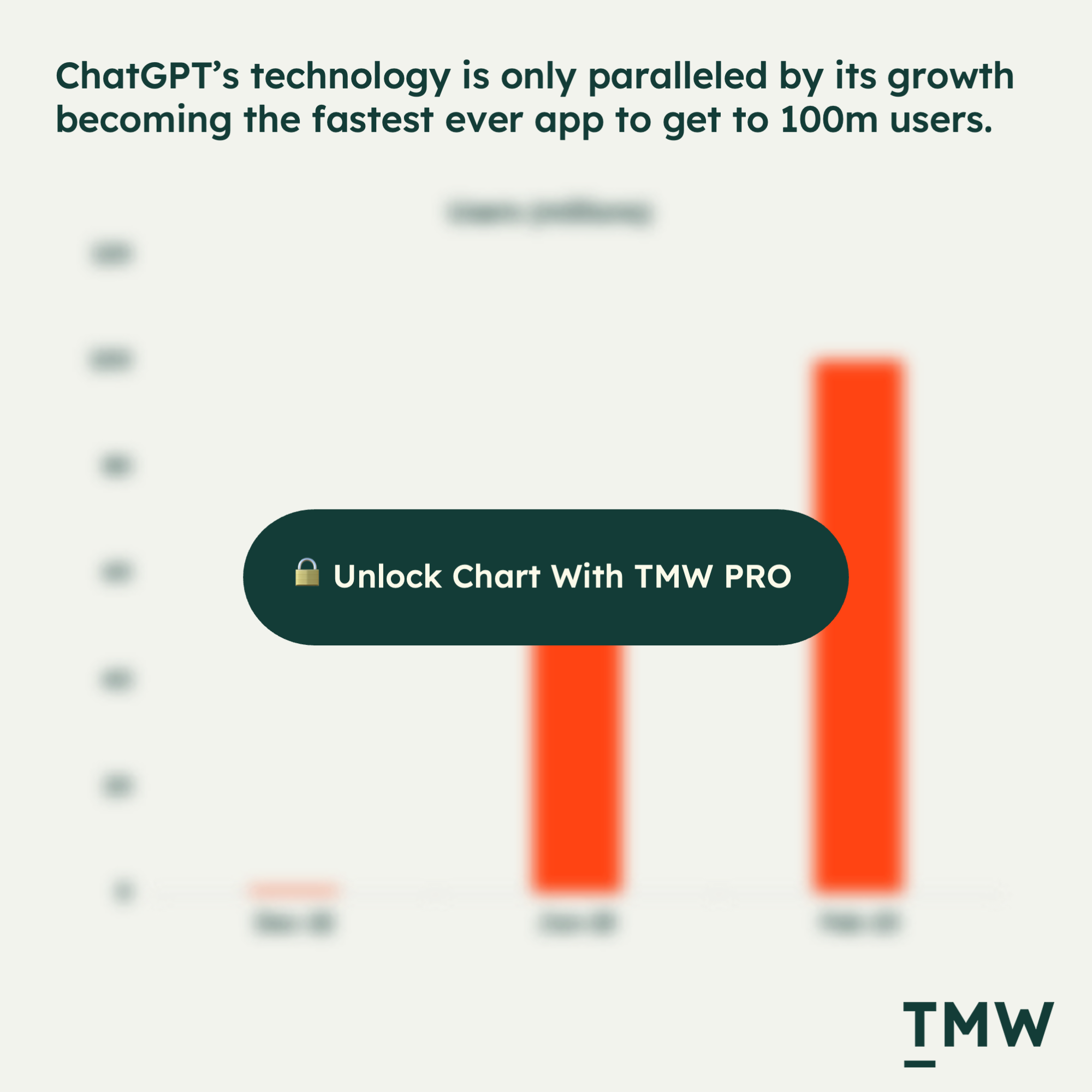
And while Google’s BARD and LLM models still trail behind in reliability and features (let’s not forget the company’s release demo hiccup that cost the company $100 million in a day), OpenAI’s growth in user bases does not even compare to Google. ChatGPT has more than 65 million visits per day; Bing, the search app using ChatGPT as the backend, is getting 40 million visits per day. Google’s assistive AI tools were used over 180 billion times per day in 2022, and Google Search is used more than a trillion times a year at a 91% market share. Gmail, Google Search, Android, Chrome, YouTube and Google Play all serve more than 2 billion users each.
Compared to OpenAI and Microsoft, it's Google’s world; we’re just living in it.
But OpenAI is not a consumer company yet, although there are millions of consumers on their platforms. It’s a tool that anyone can use, but it doesn’t have the wide-ranging consumer appeal that Google Search has held for more than two decades.
This makes all the difference. According to Morning Consult’s annual brand trust report, Google’s net trust ranking is higher than any other company globally. The company is squarely in the goodwill of the consumer, and while BARD is sorely lacking the kind of polish that GPT-4 is serving up, this won’t matter too much in the long run.
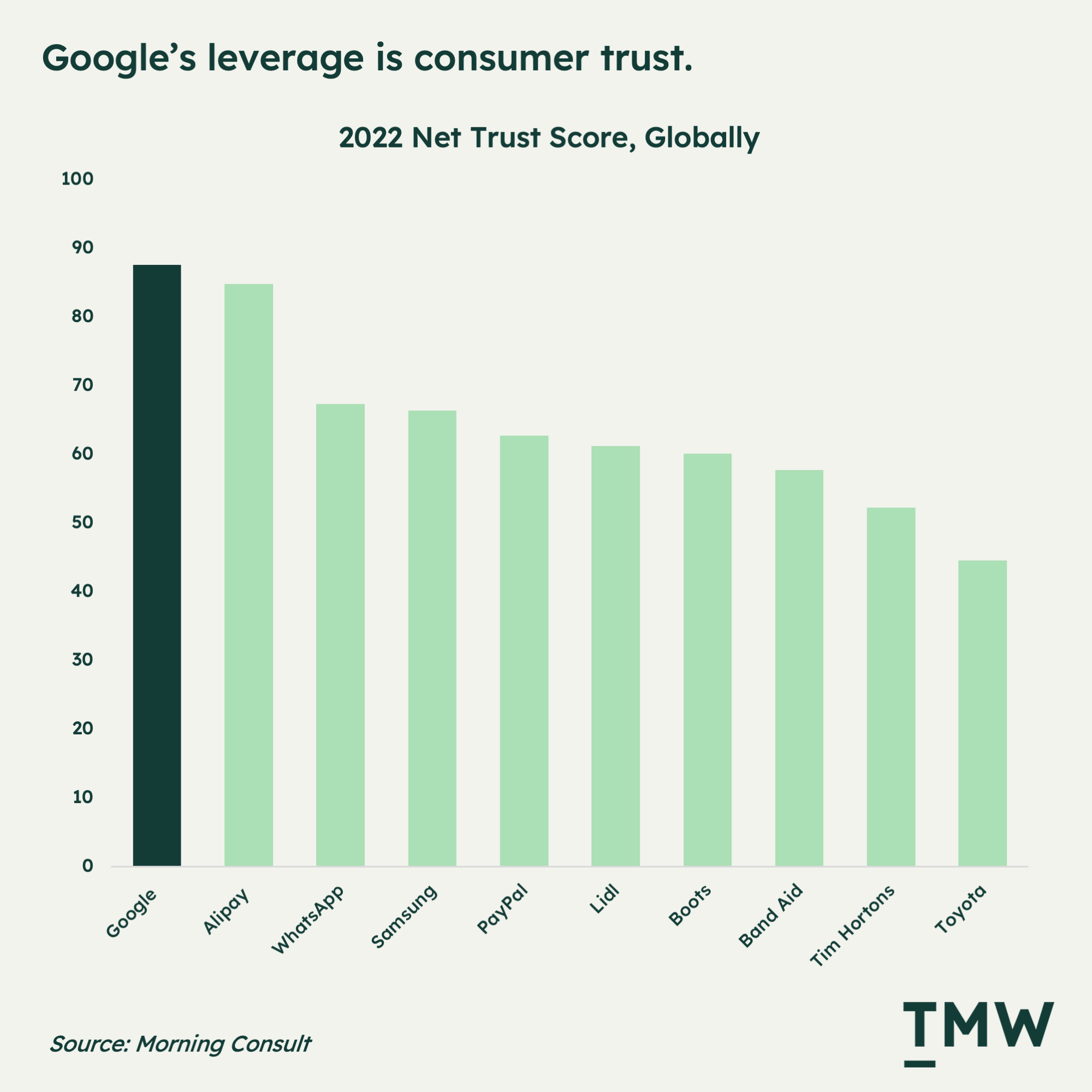
As long as Google’s flavor of generative AI is functional, the problem for the company will be distribution and marketing. Besides, BARD is not the only program being developed in Google for the generative AI shift; Google is also working on PaLM 2, a next-generation language model for multilingual reasoning and coding; Gemini, a multi-modal AI that is highly efficient with integrating with other tools, and Duet AI for Google Cloud, an AI collaboration tool that works alongside code development.
Like literally every other technology on the web, there’s an innovation shift led by a founding company – which is a first push into unknown territory – and then this technology becomes a commodity for larger brands to adapt. Innovation doesn’t matter until there’s a massive brand with high trust and consumers in the billions wanting to commandeer it to further its own commercial goals, and that’s exactly what we’ll see with Google’s deliberately slow approach with generative AI.
While OpenAI is playing the fast and loose game by bringing these technologies into the market quickly and iteratively (in just two weeks OpenAI launched a new iOS app, a codex tool, and even more plugins). The role of OpenAI rapid development and launch cycles is it will help Google to see the up and downsides of how consumers react to these new technologies. After all, when it comes to AI tools that do the thinking bit for you, trust matters more than ever, because a LLM that talks to me can only work if humans can trust that the responses will be high quality and for the good of my interests.
Google is stressing this strategy with the release of its generative search product at Google IO:
“There are known limitations with generative AI and LLMs, and Search, even today, will not always get it right. We’re taking a responsible and deliberate approach to bringing new generative AI capabilities to Search. We’ve trained these models to uphold Search’s high bar for quality, and we will continue to make improvements over time. They rely on our hallmark systems that we’ve fine-tuned for decades, and we’ve also applied additional guardrails, like limiting the types of queries where these capabilities will appear.”
It’s in this way that consumer brands become market prisons if they are left to grow without limits. A platform becomes the all-encompassing way to access new products, services and innovation. Microsoft is attempting to achieve this with an aggressive push with the New Bing, and an entire catalog of generative AI products for the Office suite. But the brand equity in search is not Microsoft’s domain. Consumers just don’t use Bing as much; it’s not the verb everyone uses. Besides, despite an uptick of growth, in the big picture, the New Bing had grown just 0.25 percent in the past three months.
Google AI’s assistant tool for writing emails is another step in this direction. Casey Newton suggests that this could be the killer app that migrates people over to Google’s side of the AI arms race:
“Ideally, though, you’d never have to visit a dedicated website to use generative AI in the first place. For example, at the moment lots of people are having ChatGPT write their emails and then porting them over into their email client of choice. Google is taking the obvious next step: promising that later this year, you’ll be able to just ask Gmail to write the email for you in the message composer window. I predict ChatGPT sees fewer copy and paste actions after that.”
Like the smartphone market, Apple came in first with a superior product after a decade of other companies trying all kinds of combinations to get the right match between the physical and digital. But it’s Google’s Android device that became the market leader globally. That matters.
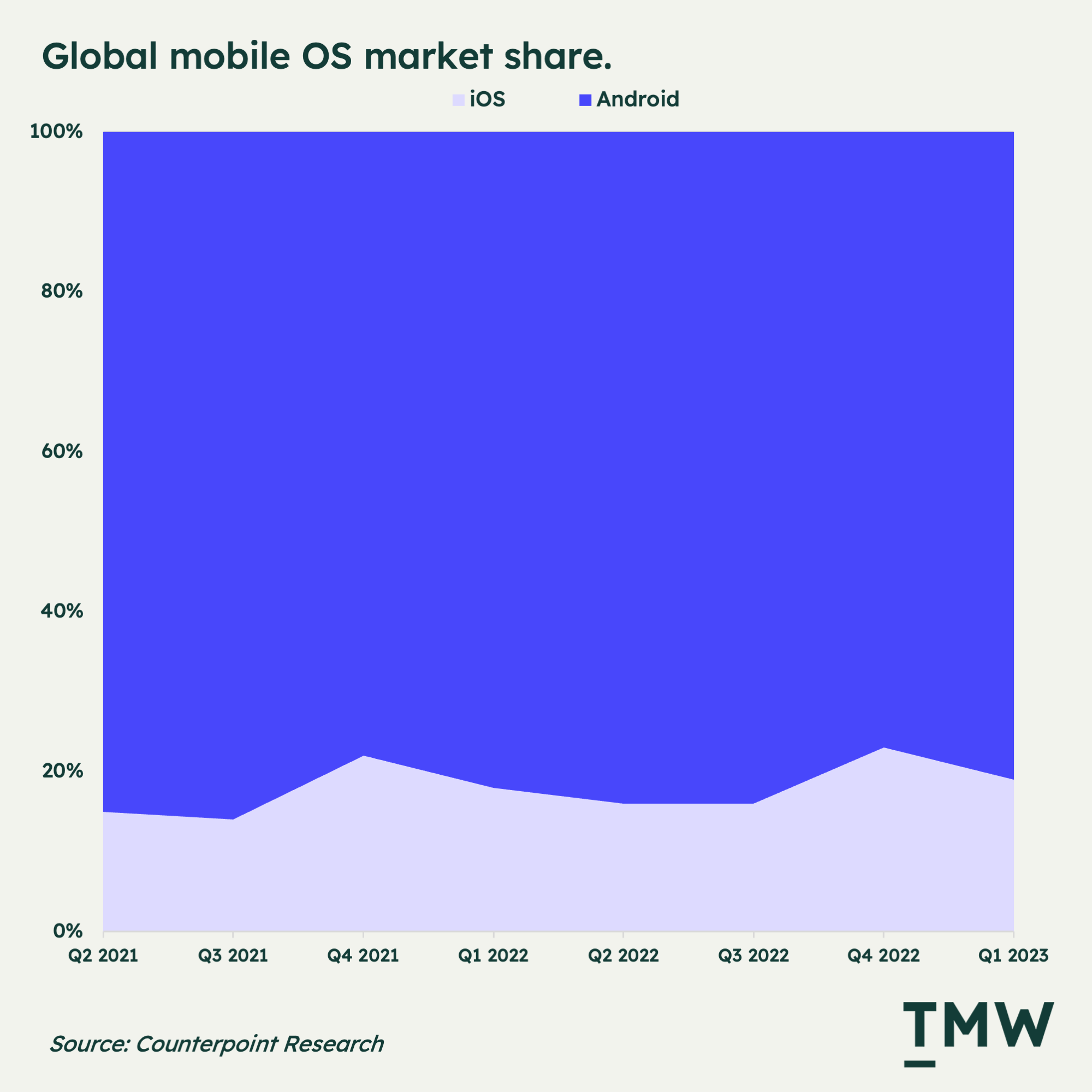
And even though Samsung is looking to replace Google Search on its devices with Microsoft’s Bing because of Google’s lackluster approach to generative AI, that won’t matter much. Android is an open-source alternative to iOS. It’s a prison of the smartphone market, which will amplify Google’s vision of generative AI when the company finally gets it right.
Our ability to create things with our own hands has been diminished with the industrial revolution. The printing press and the internet impacted our ability to handwrite in cursive, and as Steve Jobs once said, computers work as “bicycles for the mind”; but what happens when the bicycles start riding themselves? That’s right: we get less exercise, become unhealthy and stagnate. Generative AI for the mind won’t make us smarter, just more reliant on massive tech companies.
In sum, Google has both the hardware, software, networks, and algorithms to make the most use of generative AI. The only wrinkle is its ability to actually get stuff done.
The lazy dragon
There’s a reason Google is talking so much about generative AI right now. It’s because, for the first time in 20 years, its core product is under threat from emerging technology. OpenAI apparently became a code red at the company after launching, possibly shocking the AI and search product teams back into action after a long peacetime at the top of the tentpole.
But let’s remember that most enterprise companies with huge brands suffer with alignment and that Google’s dominance over its markets has given the company not much in terms of incentives to continue to drive innovation or even just efficiently drive down costs.
But the other side of the problem is the risk equation. Pack McCormick from Not Boring suggests that this was the big blocker for Google all along. The company positioned itself into a corner with Search, it became the cash cow, and now staff doesn’t want to tinker with it too much:
“The biggest and most obvious downside is that Google’s search ad business is just too good to risk. Counter-positioning works precisely because incumbents aren’t willing to risk damaging their existing business. It stands to reason that the better that existing business is, the less willing an incumbent would be to risk it. The better your Position, the better target you are for counter-positioning. And at $225 billion, Google’s search business is as good as it gets.”
The company has become a lazy dragon. Like in The Hobbit, The Desolation of Smaug, there’s a huge dragon jealously protecting its piles of gold. Google is the dragon and has just woken up. The company has been taking a defensive position in search for a long long time, and only now have the stakes been raised by Microsoft and OpenAI.
But for Google to properly enter the generative AI trend, it must disrupt its own ways of working. In a widely shared essay from Praveen Seshadri chronicling all of the internal dysfunctions that prevent Google from building successful new products, he concludes that the company has taken an insular focus and pride that Google continues to create immense value for the world, which he says is mostly a collective delusion:
“Within Google, there is a collective delusion that the company is exceptional. And as is the case in all such delusions, the deluded ones are just mortals standing on the shoulders of the truly exceptional people who went before them and created an environment of wild success. Eventually, the exceptional environment starts to fade, but the lingering delusion has abolished humility among the mere mortals who remain.
You don’t wake up everyday thinking about how you should be doing better and how your customers deserve better and how you could be working better. Instead, you believe that things you are doing already are so perfect that they are the only way to do it. Propaganda becomes important internally and externally. When new people join your company, you indoctrinate them. You insist on doing things because “that’s the way we do it at Google”. Never mind if most people quietly complain about the overall inefficiency and incompetence.”
Adding to this, Ben Thompson thinks that Google’s market dominance across a variety of touchpoints makes for a good story for generative AI. But it’s held back by figuring out how the technology will work to improve its ad model:
“To that end, I take this Google I/O as evidence that AI is in fact a sustaining technology for all of Big Tech, including Google. Moreover, if that is the case, then that is a reason to be less bearish on the search company, because all of the reasons to expect them to have a leadership position — from capabilities to data to infrastructure to a plethora of consumer touch points — remain. Still, the challenges facing search as presently constructed — particularly its ad model — remain.”
But can the company shift into a wartime-like mentality with the core product it's been coasting on for more than twenty years? After all, a massive moat is useful for keeping the baddies out, but it also keeps you stuck in one place.
The final abstraction rests with the mainstream
Don’t get me wrong, generative AI is fascinating. It’s creating a whole new channel for customer engagement, and is causing many of us to rethink a lot of how we approach information rights and intellectual property in a world where AI can remix everything to make it relevant to us.
The final abstraction is the ability to make complex things easier to understand and grapple with. Making a clean and simple interface to search over a billion websites is one abstraction. But in the grand history of the internet, generative AI is the final destination for all abstraction – a tool that not only aggregates, consolidates and presents information in the simplest and most useful format possible, but does away with the need for this all together by offering a human-like way to interact with information with an infinite mind – an abstraction that can build other abstractions.
But here are challenges to overcome – namely mainstream trust in a powerful information technology. But there’s just as good a reason that we’re one major screw-up away from generative AI having the same kind of reception as nuclear energy after Chornobyl.
One major challenge is how legal rights will dominate the safety perception of the technology. For example: an AI-driven car hits a guy while on autopilot; who’s to blame? The manufacturer? The driver? The supplier who built the algorithm? The camera makers that guide the car? The team that wrote the code? Laying fault on AI systems will become one of the main obstacles to mainstream consumption.
This concept becomes even more important as AI automates many parts of human intellectual life, and that will have good and bad consequences. Only Google has the kind of historical legacy to weather these challenges to make something anyone can use, from the VC-funded startup founder to the 60-year-old CMO, to the impoverished child in a third-world country or the carpenter still using his Nokia 3316.
But the biggest challenge with the final abstraction is not the legal, monopolistic trajectories, IP rights or its potential to collapse entire professional industries. It’s that using it will make us all dumber, more reliant on it for daily life, and more pliant as it churns through culture to create its own.
The consumer who relies on search to find products and services is a domain that marketers know deeply and well; after all, SEO is a huge industry that is heavily optimized for marketing goals.
Dealing with artificial knowledge is an entirely different domain, but make no mistake: this is Google’s final destination. Don’t let the company’s slow and clumsy approach fool you. Generative AI will make consumers harder to reach, making marketers more reliant on AI channels to capture consumer attention and harder to control how consumers gather information about products and services. The final abstraction is our last because if Google is successful, there’s nothing else to simplify. The end state of these massive tech companies is not world domination: it’s world acceptance. Beyond tools and interfaces, knowledge is the final domain of abstraction and generative AI is a big leap forward.
The technologies are quickly improving, but we’ve reached a plateau now where the value proposition and opportunity have crystallized. All that’s left for Google to do to reach the final abstraction is solve the marketing problem. And it starts with earning consumers’ trust.
Stay Curious,
Make sense of marketing technology.
Sign up now to get TMW delivered to your inbox every Sunday evening plus an invite to the slack community.
Want to share something interesting or be featured in The Martech Weekly? Drop me a line at juan@themartechweekly.com.
